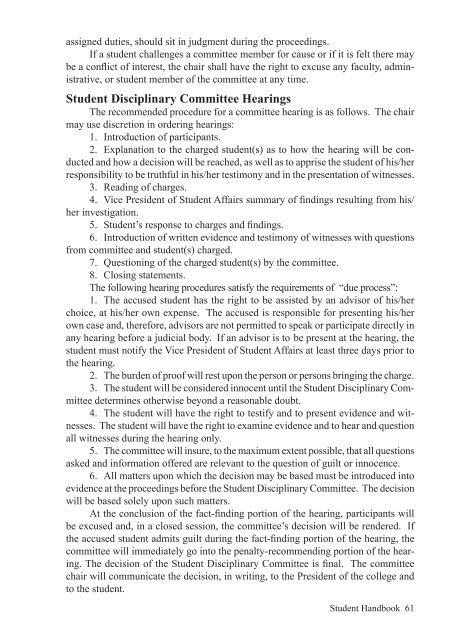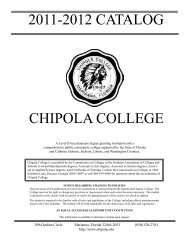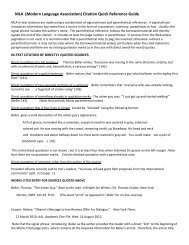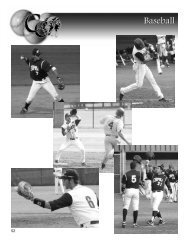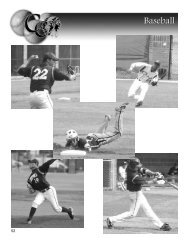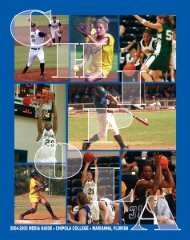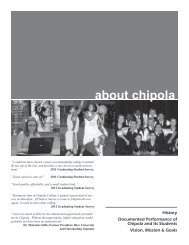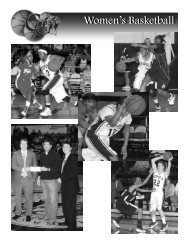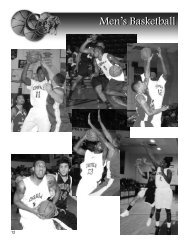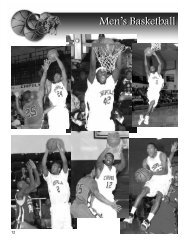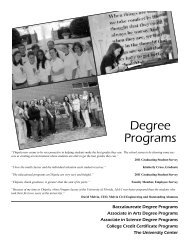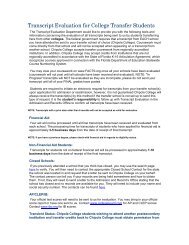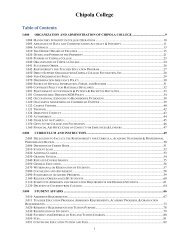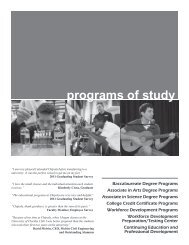Student Handbook - Chipola College
Student Handbook - Chipola College
Student Handbook - Chipola College
Create successful ePaper yourself
Turn your PDF publications into a flip-book with our unique Google optimized e-Paper software.
assigned duties, should sit in judgment during the proceedings.<br />
If a student challenges a committee member for cause or if it is felt there may<br />
be a conflict of interest, the chair shall have the right to excuse any faculty, administrative,<br />
or student member of the committee at any time.<br />
<strong>Student</strong> Disciplinary Committee Hearings<br />
The recommended procedure for a committee hearing is as follows. The chair<br />
may use discretion in ordering hearings:<br />
1. Introduction of participants.<br />
2. Explanation to the charged student(s) as to how the hearing will be conducted<br />
and how a decision will be reached, as well as to apprise the student of his/her<br />
responsibility to be truthful in his/her testimony and in the presentation of witnesses.<br />
3. Reading of charges.<br />
4. Vice President of <strong>Student</strong> Affairs summary of findings resulting from his/<br />
her investigation.<br />
5. <strong>Student</strong>’s response to charges and findings.<br />
6. Introduction of written evidence and testimony of witnesses with questions<br />
from committee and student(s) charged.<br />
7. Questioning of the charged student(s) by the committee.<br />
8. Closing statements.<br />
The following hearing procedures satisfy the requirements of “due process”:<br />
1. The accused student has the right to be assisted by an advisor of his/her<br />
choice, at his/her own expense. The accused is responsible for presenting his/her<br />
own case and, therefore, advisors are not permitted to speak or participate directly in<br />
any hearing before a judicial body. If an advisor is to be present at the hearing, the<br />
student must notify the Vice President of <strong>Student</strong> Affairs at least three days prior to<br />
the hearing.<br />
2. The burden of proof will rest upon the person or persons bringing the charge.<br />
3. The student will be considered innocent until the <strong>Student</strong> Disciplinary Committee<br />
determines otherwise beyond a reasonable doubt.<br />
4. The student will have the right to testify and to present evidence and witnesses.<br />
The student will have the right to examine evidence and to hear and question<br />
all witnesses during the hearing only.<br />
5. The committee will insure, to the maximum extent possible, that all questions<br />
asked and information offered are relevant to the question of guilt or innocence.<br />
6. All matters upon which the decision may be based must be introduced into<br />
evidence at the proceedings before the <strong>Student</strong> Disciplinary Committee. The decision<br />
will be based solely upon such matters.<br />
At the conclusion of the fact-finding portion of the hearing, participants will<br />
be excused and, in a closed session, the committee’s decision will be rendered. If<br />
the accused student admits guilt during the fact-finding portion of the hearing, the<br />
committee will immediately go into the penalty-recommending portion of the hearing.<br />
The decision of the <strong>Student</strong> Disciplinary Committee is final. The committee<br />
chair will communicate the decision, in writing, to the President of the college and<br />
to the student.<br />
<strong>Student</strong> <strong>Handbook</strong> 61


